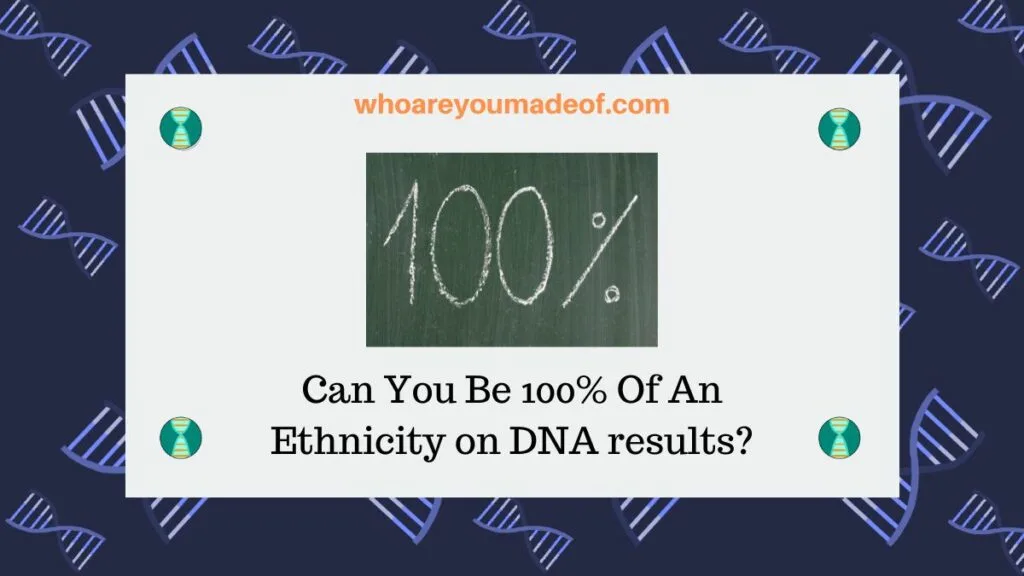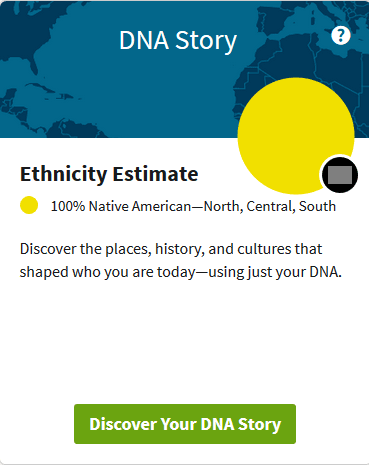Have you ever wondered if it is possible to be 100% of an ethnicity on your DNA results? In this post, learn whether it is possible to show DNA matching 100% to a particular region of the world.

Many people first view their ethnicity estimate with a bit of surprise and skepticism. This is especially common when most or all of a person's ancestors come from one place, yet their DNA seems to match regions where they have no known ancestry.
If all of someone's ancestors come from the same place and they received many different regions on their ethnicity estimate, it could make them wonder if it is even possible to be 100% of an ethnicity? Does everyone have a strange collection of regions on their DNA results?
What does it mean to have an ethnicity?
Before we really jump into this topic, I feel like it is very important to first discuss the definition of ethnicity. It is a word that is often confused and misused.
Ethnicity is generally understood as belonging to a group of people, often described a social group, that is connected by a common culture. The common culture could include language, beliefs, traditions, religion, and many times, ancestry.
Ethnicity is not the same thing as the non-biological, human-designed, social construct called "race", and it also has little to do with our physical appearance. Depending on how ethnicity is described or determined, there are likely a thousand or more different ethnicities around the world, and some people might identify as belonging to more than one group.
It is also important to know that ethnicity is not always the same as nationality. For example, the word "American", often used to describe people who live in the United States, is a word commonly used to describe the nationality of someone from the United States.
However, there are people of diverse ethnicities living in the United States. These individuals have an American nationality, or sometimes multiple nationalities, but might identify as having a cultural affinity with a specific ethnicity.
After I first published this article, I received an excellent and thoughtful comment from a reader who wanted to point out that many African Americans identify more with an African-American ethnicity than some of the African regions that show up in their ethnicity estimates.
This is very important because it goes to the heart of any discussion about ethnicity. Every person should have the right to define their ethnic identity how they feel best fits their individual and shared cultural experiences in this world.
Excellent. Now that those definitions have been discussed, and the scope of this post set, let's get started.
Our ancestors' ethnicity may be different than our ethnicity
Since ethnicity is a complicated mixture of genetics, language and culture, and sometimes even religion, we can have a different ethnicity than that of some, or even all, of our ancestors. For example, someone who lives in Poland with a grandparent from Romania, might identify as being ethnically Polish, even though 25% of their ancestors were from Romania.
This could be because they live in Poland, speak Polish, eat Polish food, and practice Polish customs and traditions. This hypothetical person could feel a cultural affinity with the Polish people, and also likely has Polish nationality and even citizenship.
However, if they were to take a DNA test, we would certainly see that a portion of their DNA would closely match Romanian communities. In addition, they would also likely have genetic relatives living in Romania.
When we examine our DNA results, what we are really seeing is the ethnicities of our ancestors. We may or may not identify as having the same ethnicity as they did, since many times we live in entirely different countries - or even on different continents, thousands of miles away from the place where they called home.
We may share very little in common with many, or even all, of our ancestors in terms of language and culture. For example, if I sat down at a table with all of my great-great grandparents, I would not be able to communicate in my first language, English, with more than half of them.
In the context of this article, what we really wonder is if it is possible for someone's DNA to match only one ethnicity? In other words, could a person have inherited only DNA matching one region from all of their ancestors?
Can you have 100% ethnicity from one region?
Yes, it is possible to have 100% ethnicity matching one region on DNA results. This is most commonly seen in individuals who have a deep ancestry in one region of the world.
For example, the DNA tester whose results you see below showed 100% Native American on their Ancestry DNA ethnicity estimate, which was not surprising to them because they speak an indigenous language, have a cultural affinity to an indigenous group, and have no known ancestors in their family tree who were not from the Americas.

Over the course of the past several years, I have seen many other examples of DNA results matching only one region. Some specific results that come to mind, specifically from Ancestry DNA, are results matching the Philippines, European Jewish, and Eastern Europe and Russia.
We can see ethnicity estimate matching 100% to a particular region from any of the most popular autosomal DNA testing companies.
100% matching a region might change later
As companies provide more detailed and refined results, we could find that "100%" results become less common. This is because many of the regions currently reported on ethnicity estimates are what are sometimes described as "panethnicities", which is sort of like a broad group of ethnic groups that whose cultures and traditions share a common origin.
Take, for example, someone who shows that 100% of their DNA is from Eastern Europe and Russia, yet has parents from Slovakia and Poland. On Ancestry, this region currently covers several countries, and most people with ancestry from this region likely only have known ancestry from only a few of those countries.
Over time, results will likely become more specific, since Ancestry, like the other testing companies, periodically updates ethnicity estimates based on new technology and research. This is great news for those of us using our DNA results to learn more about our family tree, since having more detailed data can help us narrow down where we should search for ancestors.
So, our hypothetical person with heritage in Eastern Europe may eventually show Slovakia and Poland, as an example, which would mean that their "100%" might become broken into different percentages matching more specific areas with the "100%" region they saw previously on their results.
What if you were expecting 100% of an ethnicity on your estimate?
If someone was expecting to see 100% matching a specific region on their ethnicity estimate, they might be surprised if their results come back showing that they may have had ancestors from a variety of areas. This is a very common experience, and it doesn't mean that the test results are incorrect.
The most likely explanation for not showing 100% on an ethnicity estimate when all known ancestors were from one part of the world is simple. Our ancestors were more diverse than we believe that they were.
We often imagine that our ancestors lived in relative isolation from neighboring geographic areas. Even though it certainly was more difficult to travel or migrate between regions, it happened all of the time.
Humans are excellent travelers, and they always have been. We have been traveling long distances and on our own and in groups for many tens of thousands of years, which is how the humans species was able to migrate out of Africa over time and establish permanent settlements on six continents.
In other words, our ancient human ancestors were travelers and our more recent ancestors were no different.
We inherit DNA from many of the ancestors of our known ancestors, which equals a great number of possible ancestors. Almost no one has a family tree going back 500 years on all lines of the tree, which could equal over 1 million ancestors, assuming no pedigree collapse, so how sure could we really be about what should really be on our ethnicity estimate?
My grandmother, who would have expected to see 100% English on her results based on her extensive, verified known family tree, only showed 80% matching England and Northwestern Europe. No doubt, the other regions that show up on her results are due to distant ancestors that she has that hailed from somewhere other than Britain.
Another way to look at it is that my grandmother's English ancestors had ancestors from other places. Likely regions would include those immediately adjacent geographic areas, such as Ireland, Scotland, Wales, or even France, Germany, or Scandinavian countries.
Conclusion
I hope that this article has helped you learn why it's possible to show 100% ethnicity matching one particular region on DNA results, but why most of us won't see that on our results. Ethnicity estimates can be fun and interesting and they can help us discover distant ancestry we never knew we had.
If you have any questions about something you read here, or if you would like to share your story of expecting 100%, yet not seeing that on your results, I would love you to join in the discussion below.
Thanks for reading today!

Michael Brendan Breen
Monday 1st of January 2024
Ancestry results show 100% Irish DNA - South West Munster, Iveragh Peninsula, North Iveragh Peninsula, Central Munster, Leinster Ireland which was expected with 4 grandparents born in Kerry (2), Cork, and Galway. What was not expected was the number of distant cousins in Tasmania, Australia, and New Zealand!
Maisie
Sunday 6th of August 2023
My 1st cousin showed up as 100% Scots-Irish. His parents were both of Irish descent. My father and his were brothers yet I am only 62% Scots-Irish. Of course, the difference is that we have different mothers, but my mother's heritage is also Irish, apart from a half-English, half Irish great-grandfather. My remaining 38% comes from 28% Scandinavian and 10% Iberian. Everyone tells me that the Scaninavian DNA probably came from the Vikings, but surely that can't be right? My sister also has 29.9% Scandinavian. Should I.pusue this further?
Lianne
Thursday 26th of January 2023
I read your article & basically it says it is imposible to only be from one geographical area, or in my case a group of islands with no supposed DNA match anywhere else in the world. I thought right away it must of been wrong (not based on family history) just because it is very unlikely. Is there a better or more reliable DNA testing product than 23andMe?
Thanks in advance.
Tom
Wednesday 19th of October 2022
2nd generation American. According to Ancestry I am 100% Irish.
Jo Ayres
Sunday 14th of August 2022
Hi, great article. Very interesting. I just got my DNA results and was surprised that I had 100% north Western European British and Irish. My Grandfather was polish and Grandmother Scottish and other Grandparents English. Why did nothing show up from my Polish Grandfather it's all so interesting. I would be so grateful for any insight.